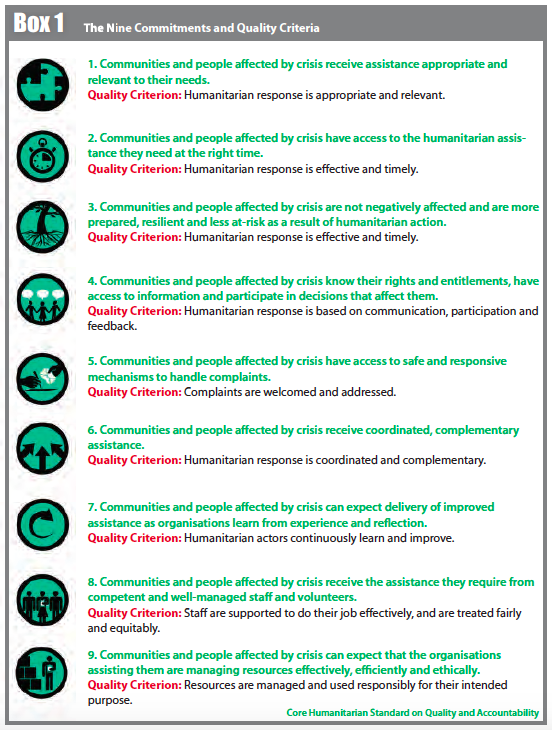Core Humanitarian Standard on Quality and Accountability
In humanitarian disaster or conflict situations, it is critical that aid workers deliver their best quality work. Yet in a sector characterised by high turnover, rapid deployments, steep learning curves and the need to collaborate with multiple humanitarian actors, it is often difficult for responders to know when and how to apply the standards that enable them to deliver their best work and to be accountable to the communities they serve. The recently launched Core Humanitarian Standard on Quality and Accountability (CHS) has been devised to clarify the responsibilities of aid workers, and to make the implementation of the standard simpler and easier. A single core standard will contribute to better humanitarian response. A coherent and easy-to-use standard is more likely to be put into practice and make a difference to the lives of crisis-affected communities.
The CHS is a direct result of the Joint Standards Initiative (JSI) in which the Humanitarian Accountability Partnership (HAP) International, People In Aid and the Sphere Project joined forces to seek greater coherence for users of humanitarian standards. It emerged from a 12-month, three-stage consultation, during which humanitarian workers, communities and people affected by crisis, several hundred non-governmental organisations (NGOs) and networks, governments, United Nations agencies, donor agencies and academics rigorously analysed the content of the CHS and tested it at headquarters and field level. It is intended that the CHS will replace the 2010 HAP Standard in Accountability and Quality Management, the People In Aid Code of Good Practice in the Management and Support of Aid Personnel and the Core Standards section of the Sphere Handbook.

As a core standard, the CHS describes the essential elements of principled, accountable and high-quality humanitarian action. The CHS comprises a set of Nine Commitments to communities and people affected by crisis, stating what they can expect from organisations and individuals delivering humanitarian assistance. Each Commitment is supported by a Quality Criterion that indicates how humanitarian organisations and staff should be working in order to meet it, Key Actions to be undertaken in order to fulfil the Commitments and Organisational Responsibilities to support the consistent and systematic implementation of the Key Actions throughout the organisation (see Box 1).
Humanitarian organisations may use the CHS as a voluntary code with which to align their own internal procedures. It can also be used as a basis for verification of performance, for which a specific framework and associated indicators have been developed to ensure relevance to different contexts and types of organisation. Many individuals, organisations and institutions have expressed their support for the Core Humanitarian Standard since it was launched on 12 December 2014.
For more information about The Core Humanitarian Standard, related resources, statements of support and other documents under development, visit: www.corehumanitarianstandard.org.
The Core Humanitarian Standard will be made available in Arabic, French and Spanish. If you would like to translate the CHS into an additional language, please contact info@corehumanitarianstandard.org for guidance on translations. All translations will be free to access at www.corehumanitarianstandard.org.
Comments on the CHS are welcome at any time, and can be sent, along with enquiries, to info@corehumanitarianstandard.org. All comments received will be addressed in the revision of the CHS, which will be undertaken no later than December 2019.


